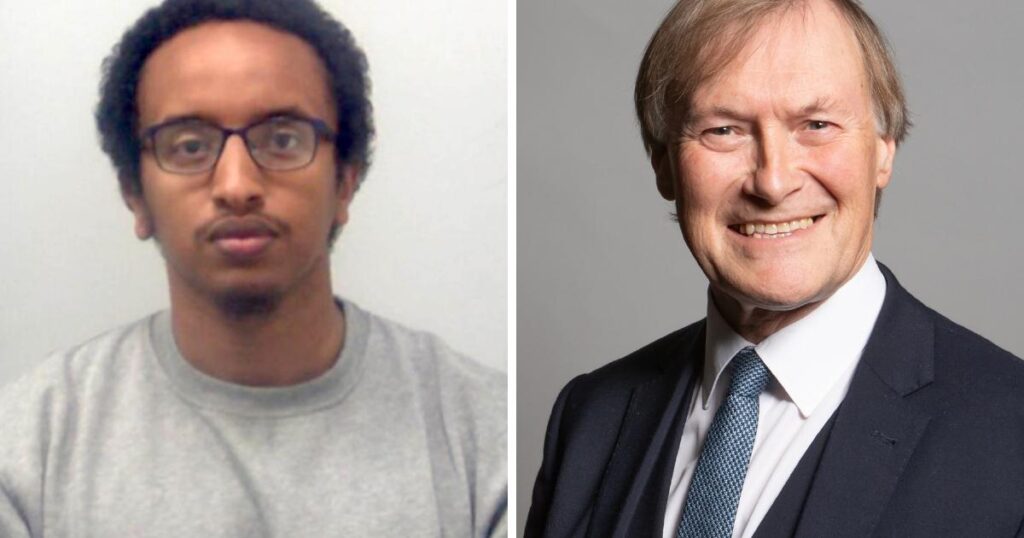Workers claimed they were “reluctant to appear greedy” by requesting funding for more sessions with Ali Harbi Ali, whose Croydon school had reported him as showing signs of radicalisation.
But a report by Lord David Anderson has found this claim to be of “limited credibility”.
Staff described Ali as a “great person” and stopped working with him, without even completing a final report.
Seven years later, and living in Kentish Town, Camden, he travelled to Southend and stabbed Conservative MP Sir David to death with a 12-inch knife at a constituency surgery.
The terrorist – whose father was a senior official in Somalia who had campaigned against terrorist groups – told police: “I want him dead. I want every Parliament minister who signed up for the bombing of Syria, who agreed to the Iraqi war, to die.”
Lord Anderson said there had been “a long string of failings” by Prevent – but that there was no evidence doing things differently would have averted Sir David’s assassination.
The Amess family said they were “deeply upset, hurt and frankly offended” by the way the report had been published, giving them “next to no notice” and no “meaningful advance sight”.
“This has left the family with no time whatsoever to read, digest or, more importantly, take legal advice on its contents before it was released into the public domain,” said spokesman Radd Seiger.
“The family note that parts of the report were leaked to the media first and call on the Home Office to explain this further insult to the family.
“It is hard to see this as anything other than a deliberate strategy by the Home Office to ensure the report’s publication attracted the minimum possible publicity. If so, they should be ashamed of themselves.”
The report said Ali, who killed Sir David on October 15, 2021, was a “lone actor”, not directed by any wider group.
He was radicalised by Islamic State propaganda about Syrian rebels who fought the “brutality and tyranny of President Assad”.
Ali was referred to Prevent in 2014 by his sixth-form school, Riddlesdown Collegiate in Croydon.
His attendance had dropped, he refused to engage with female staff and he said he “did not wish to live among non-believers”.
However, he described Islamic State to Prevent officers as “a joke” and said murdering civilians was “crazy and not the Muslim way”.
Prevent “functioned well” at first, said Lord Anderson – but there then followed “a long string of failings… most of which were the product of poor judgement, poor communication and a lack of follow-through”.
Ali had only one meeting with an intervention provider, at which he stated that he did not agree with extremists and had “no grievances against the west or other faiths or groups”.
One worker wrote that Ali “seems to be a great person”. Prevent noted that he happily met workers at a McDonald’s restaurant, surrounded by patrons “eating non-Halal food”.
Lord Anderson found Ali had been “deceiving” them and “concealed his true beliefs”.
A detective inspector requested a check of Ali’s social media accounts, but it seemed never to have been done.
Computer records said there was an “action plan” – but there was “no evidence” one was ever created, wrote Lord Anderson.
While police “awaited further input”, Prevent decided one meeting with Ali was enough – and there was “no record of any closing report having been provided,” the report continued.
READ MORE
Communications between agencies were “inadequate” and “plainly unsatisfactory”.
“It is possible to conclude only that the communications between police and the intervention provider were inadequate.”
But, it said, “Even if these errors had never been made, there can be no assurance that Prevent would have identified the full extent of Ali’s slide into a terrorist mindset, let alone averted a crime committed several years later.”
The Amess family said they would “now take the time we were not afforded by the Home Office to consult with our legal team.”
Following the publication of the report today, Lord Anderson said: “A huge amount of effort has already gone into making Prevent a stronger programme than the one which failed to deal in 2014 with the future killer of Sir David Amess.
“A blizzard of further initiatives has followed the Southport murders of last summer. Though it is too early for all of these to be fully evaluated, taken together they will reduce the chances of such failings being repeated.
“But more needs to be done. It has to be clear that people with a fascination with extreme violence can be suitable subjects for Prevent, even when they have no discernible ideology.”
He added: “In the longer term, I believe that Prevent could work better as part of a comprehensive violence prevention and safeguarding strategy.”




